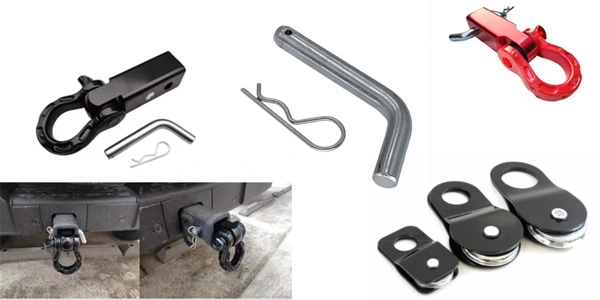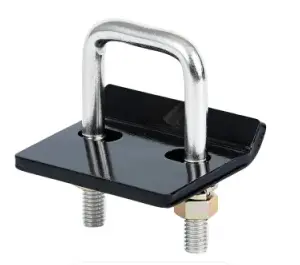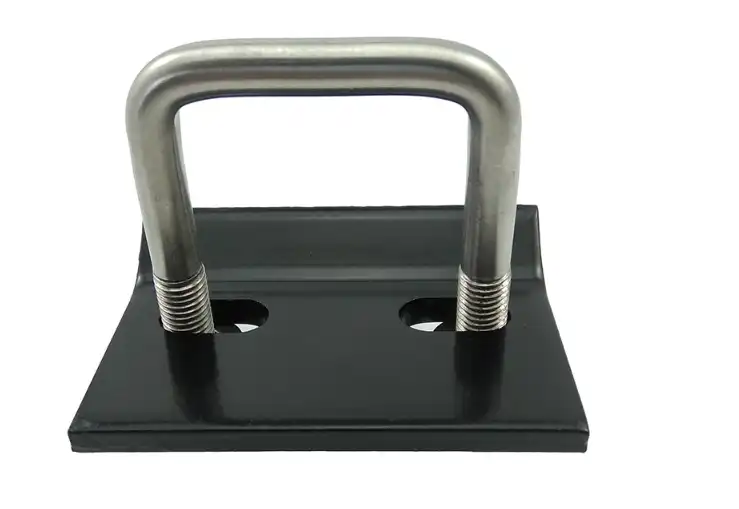Go Anywhere in Silence: The Universal-Fit Hitch Tightener for Modern Adventures
2025-11-11 11:03:38
Picture this: you're driving down the highway with your trailer loaded for a weekend adventure, but every bump in the road produces an annoying metallic clang that echoes through your vehicle. That rattling sound isn't just irritating—it signals excessive movement between your hitch and receiver that can lead to premature wear, damaged equipment, and compromised safety. The Universal-Fit Hitch Tightener solves this widespread problem by eliminating unwanted movement and noise, transforming your towing experience into a smooth, silent journey. Whether you're hauling bikes, cargo carriers, or trailer ball mounts, this essential accessory ensures your adventures begin and end with peace of mind.

Understanding the Universal-Fit Hitch Tightener and Its Critical Role
The Universal-Fit Hitch Tightener represents a breakthrough solution for one of the most common complaints among trailer and hitch accessory users: excessive rattling and movement. This precision-engineered device works by creating a secure, vibration-free connection between your hitch insert and the receiver tube. Unlike temporary fixes or makeshift solutions, a properly designed Trailer Hitch Tightener uses mechanical pressure to eliminate the tolerance gap that manufacturers build into hitch receivers for easy insertion and removal. Modern Universal-Fit Hitch Tighteners typically employ a robust U-bolt design combined with a pressure plate system that distributes clamping force evenly across the receiver. This engineering approach prevents localized stress points while maintaining consistent pressure even under dynamic loading conditions. The tightener's universal compatibility stems from its adjustable design, accommodating both standard 2-inch and 1.25-inch receiver sizes that represent the vast majority of consumer and commercial applications. Advanced models incorporate corrosion-resistant materials such as Grade 8 steel with galvanized or Dacro coating, ensuring longevity even in harsh marine or winter environments where road salt and moisture accelerate degradation.
-
Why Hitch Movement Creates Problems Beyond Just Noise?
Many vehicle owners underestimate the cascading problems caused by loose hitch connections. The repetitive metal-on-metal contact doesn't merely generate annoying sounds—it actively wears away the protective coatings on both the hitch and receiver, exposing raw metal to the elements. Over time, this wear pattern enlarges the tolerance gap, exacerbating the movement problem and potentially compromising the structural integrity of your towing system. A quality Hitch Tightener prevents this deterioration by maintaining consistent contact and eliminating the micro-movements that cause accelerated wear. Beyond physical wear, excessive hitch movement introduces instability into your entire towing setup. When cargo carriers or bike racks shift even slightly during transit, the changing weight distribution can affect your vehicle's handling characteristics, particularly during emergency maneuvers or adverse weather conditions. Professional fleet managers recognize this risk and specify anti-rattle devices as standard equipment precisely because they understand how seemingly minor vibrations compound into major safety concerns over thousands of miles of operation.
Selecting the Right Universal-Fit Hitch Tightener for Your Application
Not all hitch tighteners deliver equivalent performance, and understanding the key differentiators helps ensure you select a device that matches your specific requirements. The most critical specification involves material composition and surface treatment. Entry-level models often use standard carbon steel with basic zinc plating, which provides adequate protection for occasional recreational use in dry climates. However, serious adventurers who regularly encounter rain, snow, or coastal environments should prioritize stainless steel construction or advanced coating technologies that prevent rust formation even under prolonged exposure to moisture and road chemicals. The clamping mechanism represents another crucial consideration when evaluating Universal-Fit Hitch Tightener options. Traditional U-bolt designs excel at distributing pressure and offer straightforward installation, but the quality of the threading and nut design significantly impacts ease of use and long-term reliability. Premium models incorporate self-locking nuts or nylon inserts that prevent loosening from road vibration, eliminating the need for periodic re-tightening. Some innovative designs feature quick-release mechanisms that maintain security while allowing rapid removal when you need to swap accessories, though these convenience features should never compromise clamping strength.
-
Material Quality and Certification Standards Matter
When sourcing a Trailer Hitch Tightener from manufacturers like Qingdao RUIRUI Machinery Co., LTD, certification compliance provides objective verification of product quality and performance capabilities. ISO 4032 certification confirms that fastener components meet international dimensional and mechanical property standards, ensuring consistent thread engagement and load distribution. For commercial applications or heavy-duty recreational use, DOT FMVSS 121 compliance verifies that the tightener can withstand the demanding conditions specified in federal motor vehicle safety standards for air brake systems and related towing components. The choice between Grade 8 steel and stainless steel involves balancing strength requirements against corrosion resistance needs. Grade 8 steel offers exceptional tensile strength exceeding 150,000 psi, making it ideal for heavy-duty applications where maximum clamping force is essential. However, this carbon steel requires protective coatings to prevent rust. Stainless steel alternatives, particularly 304-grade alloys, provide inherent corrosion resistance without surface treatments, though they typically deliver slightly lower ultimate strength. Many professional users prefer galvanized Grade 8 steel for its optimal combination of strength and weather resistance, especially when reinforced with Dacro coating that adds an additional protective barrier against environmental degradation.
Installation Best Practices and Performance Optimization
Proper installation of your Universal-Fit Hitch Tightener directly impacts its effectiveness and longevity. Begin by thoroughly cleaning both the hitch insert and receiver tube, removing any accumulated dirt, rust, or debris that could prevent full contact. Even minor contamination can create pressure points that reduce clamping efficiency or accelerate wear. For receivers that have developed surface rust, light abrasion with a wire brush or sandpaper restores a clean metal surface that allows the Hitch Tightener to establish optimal contact. Position the U-bolt so it straddles the receiver tube with the pressure plate centered on the hitch insert. The plate should make contact with a flat surface rather than edges or curves, distributing clamping pressure across the maximum possible area. Thread the nuts onto the U-bolt by hand initially, alternating between sides to ensure even engagement. Once hand-tight, use a socket wrench to apply final torque, again alternating between nuts to maintain balanced pressure. Avoid over-tightening, which can deform components or strip threads—the goal is firm, consistent pressure rather than maximum possible torque.
-
Maintenance and Inspection Protocols
Even the highest-quality Trailer Hitch Tightener requires periodic inspection to maintain optimal performance throughout its service life. Before each trip, perform a visual check to confirm the pressure plate remains properly positioned and the mounting hardware shows no signs of loosening. Give the nuts a quarter-turn with your wrench to verify they maintain proper torque—if they rotate easily, retighten to specification. This quick check takes less than thirty seconds but can prevent the gradual loosening that occurs from accumulated road vibration. Every few months or after extended trips through challenging conditions, remove the Universal-Fit Hitch Tightener completely for detailed inspection and cleaning. Examine the U-bolt for any signs of deformation, cracking, or corrosion that could compromise structural integrity. Check the threads for damage or excessive wear that might prevent proper engagement. Clean all components thoroughly and apply a light coating of anti-seize compound to the threads before reassembly, which facilitates future removal while preventing galvanic corrosion between dissimilar metals. This preventive maintenance extends component life and ensures consistent performance season after season.
Real-World Applications Across Diverse Industries
The versatility of the Universal-Fit Hitch Tightener extends far beyond recreational towing applications. Commercial fleet operators managing delivery vehicles, service trucks, and utility fleets recognize these devices as essential equipment for maintaining vehicle integrity and driver comfort. When technicians spend hours daily behind the wheel, eliminating the constant rattle from cargo platforms or tool storage systems directly impacts job satisfaction and reduces fatigue-related errors. Fleet managers also appreciate how preventing hitch wear extends the service life of expensive towing equipment and delays costly vehicle modifications. Agricultural operations represent another major application area where Trailer Hitch Tighteners provide measurable value. Farmers routinely connect and disconnect various implements throughout the work season, from seeders and cultivators to trailers hauling equipment and harvested crops. The rough terrain typical of farm operations generates severe vibration that quickly degrades loose hitch connections. By securing these connections properly, agricultural users maintain equipment reliability while protecting their substantial capital investments. The ability to customize size and coating options ensures compatibility with specialized agricultural hitches that may not conform to standard consumer specifications.
-
Specialized Requirements for Heavy-Duty and Commercial Use
Heavy-duty applications demand Universal-Fit Hitch Tighteners engineered specifically for elevated stress levels and extended duty cycles. Construction contractors towing equipment trailers, landscaping companies hauling machinery, and commercial towing operators all require components that exceed consumer-grade specifications. Qingdao RUIRUI Machinery Co., LTD addresses these demanding requirements through advanced manufacturing processes including progressive stamping and precision CNC machining that ensure dimensional accuracy and consistent mechanical properties across large production runs. For specialized applications, customization options become critically important. Fleet purchasers might specify particular dimensions to accommodate non-standard receiver configurations or request specific coating treatments optimized for their operational environment. The ability to scale production from prototype quantities through high-volume orders allows manufacturers to support both emerging businesses testing new equipment configurations and established enterprises standardizing across extensive vehicle fleets. This flexibility, combined with ISO-certified quality management systems, ensures every Hitch Tightener meets exacting specifications regardless of order size.
Technical Innovation and Manufacturing Excellence
The evolution of hitch tightener design reflects broader trends in precision manufacturing and materials science. Early anti-rattle devices employed simple wedge designs that worked through friction alone, offering inconsistent performance and frequent loosening. Modern Universal-Fit Hitch Tighteners incorporate sophisticated engineering principles including optimized bolt geometry, pressure distribution analysis, and advanced material treatments that deliver superior performance with enhanced durability. Manufacturing excellence begins with material sourcing, where only certified suppliers providing documented material properties gain approval. At facilities like Qingdao RUIRUI's advanced production complex, incoming inspection protocols verify chemical composition and mechanical properties before materials enter the manufacturing process. Computer-controlled progressive stamping equipment forms components with tolerances measured in thousandths of an inch, ensuring consistent fit and function across thousands of identical parts. Automated robotic production lines maintain quality consistency while achieving the production volume necessary to serve global markets efficiently.
-
Quality Control Throughout the Production Process
Comprehensive quality assurance extends beyond final product testing to encompass every manufacturing stage. In-process inspections catch dimensional variations or material defects before significant production resources are committed, minimizing waste while maintaining output quality. Statistical process control techniques identify trends that might indicate developing equipment problems, allowing preventive maintenance that avoids production disruptions. These systematic approaches to quality management, validated through ISO 9001 certification, provide customers with confidence that every Trailer Hitch Tightener leaving the factory meets established performance standards. Final testing protocols subject completed products to forces exceeding normal operational loads, verifying that safety margins provide adequate protection even under extreme conditions. Salt spray testing accelerates corrosion exposure, confirming that surface treatments deliver the specified protection throughout the warranty period. Pull tests validate clamping force, while vibration testing simulates thousands of miles of rough-road operation in compressed timeframes. Only products passing every specification proceed to final packaging and shipment, ensuring end users receive components ready for immediate, reliable service.

Environmental Considerations and Sustainable Manufacturing
Modern manufacturing practices increasingly emphasize environmental responsibility alongside production efficiency. Progressive facilities incorporate energy-efficient equipment, waste reduction protocols, and sustainable material sourcing into their operations. Powder coating processes, for example, generate virtually no volatile organic compound emissions compared to traditional liquid painting, while achieving superior finish durability. Closed-loop cooling systems recycle process water, dramatically reducing consumption. These environmental management practices, validated through ISO 14001 certification, demonstrate commitment to sustainable operations that minimize ecological impact. Material selection also influences environmental performance over the product lifecycle. Long-lasting components manufactured from recyclable materials like steel reduce the overall environmental footprint compared to disposable alternatives requiring frequent replacement. When a Universal-Fit Hitch Tightener manufactured from quality materials provides ten or fifteen years of service, the amortized environmental cost per year of use becomes minimal. End-of-life recycling programs allow worn components to reenter the material stream, closing the loop on resource utilization and minimizing landfill waste.
-
Responsible Sourcing and Ethical Manufacturing
Beyond environmental considerations, ethical manufacturing practices ensure fair treatment of workers and responsible community engagement. Modern facilities prioritize workplace safety through OHSAS 18001 certified health and safety management systems that protect employees from occupational hazards. Proper ventilation, personal protective equipment, ergonomic workstation design, and comprehensive training programs create work environments where people can perform their jobs safely and effectively. These investments in human capital generate returns through improved productivity, reduced turnover, and enhanced quality consciousness throughout the workforce. Supply chain transparency extends responsibility beyond factory walls to encompass raw material sourcing and component suppliers. Verification protocols confirm that upstream partners maintain comparable standards for environmental protection, worker safety, and ethical business practices. This comprehensive approach to corporate responsibility resonates with customers who increasingly factor sustainability and ethics into purchasing decisions, recognizing that the lowest price point doesn't represent true value when it comes with hidden social or environmental costs.

Conclusion
The Universal-Fit Hitch Tightener transforms towing from a noisy, wear-inducing experience into smooth, silent transportation that protects your equipment investment while enhancing safety and comfort on every journey.
Cooperate with Qingdao RUIRUI Machinary Co., LTD.
As a leading China Universal-Fit Hitch Tightener factory, China Universal-Fit Hitch Tightener supplier, and China Universal-Fit Hitch Tightener manufacturer, Qingdao RUIRUI Machinery Co., LTD offers premium China Universal-Fit Hitch Tightener wholesale solutions with competitive Universal-Fit Hitch Tightener price. Our High Quality Universal-Fit Hitch Tightener for sale comes backed by ISO certifications, experienced OEM support, and advanced manufacturing capabilities including progressive stamping, CNC machining, and multiple surface treatment options. With eight production lines, 130,000-piece annual capacity, and expertise spanning steel, aluminum, stainless steel, and specialty alloys, we deliver customized solutions that meet your exact specifications. Contact us today at info@qdkshd.com to discuss your requirements and discover why global clients from North America to Southeast Asia trust RUIRUI for reliable, high-performance trailer fasteners and accessories. Bookmark this page for future reference when you need expert guidance on trailer components.
References
1. Trailer Hitch and Towing Accessories: Engineering and Safety Standards - Society of Automotive Engineers (SAE International). Technical standards documentation covering hitch design, material specifications, and safety testing protocols for trailer coupling systems.
2. Heavy-Duty Vehicle Safety Systems: Federal Motor Vehicle Safety Standards Compliance Guide - National Highway Traffic Safety Administration (NHTSA). Comprehensive regulatory framework detailing requirements for commercial vehicle towing equipment and safety device certifications.
3. Corrosion Protection in Automotive Applications: Materials and Surface Treatment Technologies - ASM International Handbook Committee. Technical reference covering galvanization, powder coating, and advanced protective treatments for automotive components exposed to environmental conditions.
4. Quality Management Systems in Precision Manufacturing: ISO 9001 Implementation Guide - International Organization for Standardization (ISO). Documentation of quality assurance protocols, statistical process control, and continuous improvement methodologies for manufacturing operations.
Send Inquiry
You may like
